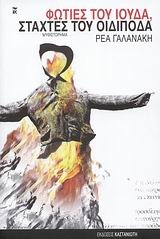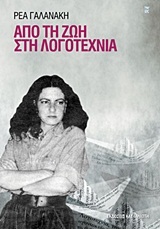 - In this latest novel, I have combined two things. On the one hand, the knowledge that in a poem of Cretan literature of the 15th century (published a few years ago), Judas bears the burden not only of his own "sins" but also those of Oedipus, i.e. the unconscious parricide of Lai and the incest with his mother Jocasta. Oral versions of the poem were preserved in Crete until the 20th century. So Judas, and all Jews later, embodied the absolute evil, not only in Crete in that era but also in a wider area, as this myth is particularly widespread in the Mediterranean. This was a new type of anti-Semitism and racism, both of which have already been recognized in Greece since the beginning of the 21st century, prior to their current expansion. As for the "Fires of Judas", they refer to a custom existing in many Greek villages, namely to burn the effigy of Judas, during a festive celebration every year at Easter, in order to symbolically punish the Jew.
- In this latest novel, I have combined two things. On the one hand, the knowledge that in a poem of Cretan literature of the 15th century (published a few years ago), Judas bears the burden not only of his own "sins" but also those of Oedipus, i.e. the unconscious parricide of Lai and the incest with his mother Jocasta. Oral versions of the poem were preserved in Crete until the 20th century. So Judas, and all Jews later, embodied the absolute evil, not only in Crete in that era but also in a wider area, as this myth is particularly widespread in the Mediterranean. This was a new type of anti-Semitism and racism, both of which have already been recognized in Greece since the beginning of the 21st century, prior to their current expansion. As for the "Fires of Judas", they refer to a custom existing in many Greek villages, namely to burn the effigy of Judas, during a festive celebration every year at Easter, in order to symbolically punish the Jew.
So, I created a novel in which I combined the aforementioned myth, in a sociogram, with modern Crete, especially with the "impenetrable sanctum" of some of its mountain villages where totally illegal and very profitable ventures had been thriving. When their existence was revealed, there was a fuss but the monolithic view of the mass media as regards these villages did not satisfy me and it does not completely coincide with mine. I was aware of the multiple layers which are inherent in such communities. That is why I have preferred their internal conflicts, the different roles of men and women and their sudden changing; I have preferred what works subversively but crucially below the surface. My interest was attracted by a brief note that "no teacher could stay in those communities for more than a year." So, I have portrayed the image of the young Greek teacher of Jewish origin, i.e. , "twice" a foreigner," whose arrival in such an "inaccessible" mountain community stirs up some local stories suppressed from the time of the German occupation, revives the customs of punishment and revenge, gives rise to love and death, continues the clash of written and unwritten law.
 However, this novel would have never been written without my book, "Silent, Deep Waters" (2006), which immediately precedes it and in which I explore in depth and recreate, in the form of a fictional chronicle, a historical and well-known case of kidnapping that happened in Crete in 1950. Both books should be read in parallel. The mirror between them is fifty years, which separate the events. The reflections from the closed mountain communities appear crystal clear in their similarities and differences, the clash between written and unwritten law continues to flourish, dividing the people, time passes, remaining still as the high mountains.
However, this novel would have never been written without my book, "Silent, Deep Waters" (2006), which immediately precedes it and in which I explore in depth and recreate, in the form of a fictional chronicle, a historical and well-known case of kidnapping that happened in Crete in 1950. Both books should be read in parallel. The mirror between them is fifty years, which separate the events. The reflections from the closed mountain communities appear crystal clear in their similarities and differences, the clash between written and unwritten law continues to flourish, dividing the people, time passes, remaining still as the high mountains.
- The collection (containing your articles published in the period 1992-2011) entitled "From Life to Literature" (Kastaniotis, 2011) is a book, a mosaic, of pieces of life, confession flashbacks in time, it is about people and places and contains thoughts about literature, history and modern "female speech". Does this book act as a fragmentary autobiography?
 - It could be seen as "pieces of autobiography." The book includes articles related to certain people who have played a major role in my life, articles written because, for some reason, I was commissioned by various media to say something about these beautiful deceased persons. In other words, I myself did not sit down to remember and share my life, I just wrote a little about myself while talking about others. An autobiography would not be written in such a way.
- It could be seen as "pieces of autobiography." The book includes articles related to certain people who have played a major role in my life, articles written because, for some reason, I was commissioned by various media to say something about these beautiful deceased persons. In other words, I myself did not sit down to remember and share my life, I just wrote a little about myself while talking about others. An autobiography would not be written in such a way.
We should consider as "autobiographical" the other articles in the book relating to literary issues such as the role of the birthplace in my writing, the way I have developed the History - Literature relationship, "the mastery of the texts," the modern "female writing", etc. Some of them had been commissioned and others not. I perceive them as "autobiographical" too because the life of every one of us is not just a series of events and fateful meetings, but also of ideas, enlightenment, concerns and questions preying on our minds, of reconsidering opinions and behaviours. Nor does literature consist only of events; they are directed by the ideas, attitudes and clashes within the specific age.
- During the municipal elections in 2010, you were elected in the new municipal leadership of Athens, in the list of Mayor George Kaminis. Your election in the front lines of the municipality means that your books alone influence a wider audience. You are the deputy chairman of the management board of the municipal radio station "Athens 9.84". How do you combine the role of a literary artist with that of a municipal employee? Do you have time to write?
 - My election really surprised me because I had refused to carry out any election campaign in support of my application, and because I have lived in Patras over the past thirty years. I just wanted to help in one direction as I was persistently invited to do so. Is the election due to my books? It is a stake won by all books, by all readers, not only by me.
- My election really surprised me because I had refused to carry out any election campaign in support of my application, and because I have lived in Patras over the past thirty years. I just wanted to help in one direction as I was persistently invited to do so. Is the election due to my books? It is a stake won by all books, by all readers, not only by me.